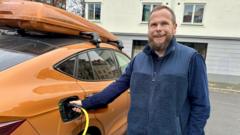Norway’s commitment to electric vehicles (EVs) showcases a remarkable transition, with comprehensive policies and incentives fostering a nearly all-electric future. As other countries look to follow suit, the unique circumstances and strategies that have propelled Norway into this leading position will be essential for developing effective EV adoption plans.
Norway Leads the Charge: First Nation on Track for All-Electric Cars

Norway Leads the Charge: First Nation on Track for All-Electric Cars
Norway's shift to electric vehicles is setting a global precedent, with 88.9% of new cars sold last year being EVs. Can this success story inspire other nations?
Norway is a country with a population of 5.5 million people, and it has consistently outpaced the rest of the world in the adoption of electric vehicles. With 88.9% of new cars sold in 2024 being EVs, Norway is on track to phase out the sale of internal combustion engine (ICE) vehicles entirely by 2025. This groundbreaking development is seen as a potential template for other nations seeking to transition away from fossil fuels.
Harald A. Møller, a prominent car dealership based in Oslo, has ceased sales of fossil fuel vehicles completely, emphasizing the shift to electric as the future of transportation. Chief Executive Ulf Tore Hekneby believes it's inappropriate to suggest that customers consider purchasing ICE vehicles at a time when range and charging capabilities of EVs have reached impressive levels.
Norway's successful transition towards electric cars did not happen overnight; it has been a gradual process that began in the early 1990s. Christina Bu, Secretary General of the Norwegian EV Association, notes that incremental tax benefits for EVs and increasingly high taxes on petrol and diesel vehicles have catalyzed consumer behavior towards electric options.
Whilst other major markets like the UK and the US are trailing (with EV registration rates of 20% and 8% respectively), Norway's robust regulatory framework and financial incentives have established a thriving EV ecosystem.
Long-term policies in Norway have provided a stable market for electric vehicles. The Norwegian government has implemented a series of perks for EV owners, including the removal of taxes on electric cars, as well as incentives like free parking and access to bus lanes. These measures, alongside a well-developed network of over 27,000 public charging stations, make the transition to electric vehicles an attractive choice for consumers.
Despite these advances, Norway's wealth, fueled largely by its oil and gas exports, plays a significant role in enabling such policies. Additionally, Norway boasts a renewable energy infrastructure primarily powered by hydroelectricity, making it easier to promote a clean vehicle agenda.
Christina Bu asserts that the key to Norway’s success lies not just in cultural values but in hard-hitting policies that encourage the uptake of electric vehicles. She emphasizes that while the country has made significant strides, its wealth allows for unique solutions that may not be directly replicable elsewhere.
As Norway moves towards its goal of having all new cars sold be zero-emission by 2025, its evolving car market showcases promising signs that transitioning to electric vehicles can indeed become a mainstream option globally.
In light of Norway's achievements, the question remains: can other nations successfully replicate this model, taking into consideration their own unique contexts and market structures? As the world confronts pressing environmental issues, Norway's experiment in electrification could serve as an invaluable case study in the transition towards sustainable transportation.
Harald A. Møller, a prominent car dealership based in Oslo, has ceased sales of fossil fuel vehicles completely, emphasizing the shift to electric as the future of transportation. Chief Executive Ulf Tore Hekneby believes it's inappropriate to suggest that customers consider purchasing ICE vehicles at a time when range and charging capabilities of EVs have reached impressive levels.
Norway's successful transition towards electric cars did not happen overnight; it has been a gradual process that began in the early 1990s. Christina Bu, Secretary General of the Norwegian EV Association, notes that incremental tax benefits for EVs and increasingly high taxes on petrol and diesel vehicles have catalyzed consumer behavior towards electric options.
Whilst other major markets like the UK and the US are trailing (with EV registration rates of 20% and 8% respectively), Norway's robust regulatory framework and financial incentives have established a thriving EV ecosystem.
Long-term policies in Norway have provided a stable market for electric vehicles. The Norwegian government has implemented a series of perks for EV owners, including the removal of taxes on electric cars, as well as incentives like free parking and access to bus lanes. These measures, alongside a well-developed network of over 27,000 public charging stations, make the transition to electric vehicles an attractive choice for consumers.
Despite these advances, Norway's wealth, fueled largely by its oil and gas exports, plays a significant role in enabling such policies. Additionally, Norway boasts a renewable energy infrastructure primarily powered by hydroelectricity, making it easier to promote a clean vehicle agenda.
Christina Bu asserts that the key to Norway’s success lies not just in cultural values but in hard-hitting policies that encourage the uptake of electric vehicles. She emphasizes that while the country has made significant strides, its wealth allows for unique solutions that may not be directly replicable elsewhere.
As Norway moves towards its goal of having all new cars sold be zero-emission by 2025, its evolving car market showcases promising signs that transitioning to electric vehicles can indeed become a mainstream option globally.
In light of Norway's achievements, the question remains: can other nations successfully replicate this model, taking into consideration their own unique contexts and market structures? As the world confronts pressing environmental issues, Norway's experiment in electrification could serve as an invaluable case study in the transition towards sustainable transportation.

















